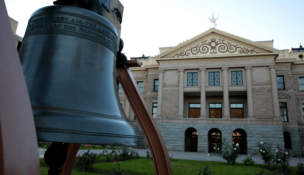Voters rejecting Prop 136
Kiera Riley Arizona Capitol Times//November 5, 2024//
A measure poised to allow constitutional challenges to voter initiatives before placement on the ballot is likely to be rejected by voters, per initial election night returns.
If passed, Proposition 136 would pave the way for substantive constitutional litigation to citizen ballot measures to come before placement on the ballot.
Election night results showed little support from voters, with 63.92% no votes and 36.08% voting in support.
Those supporting the measure say it serves to ensure unconstitutional measures do not make it onto the ballot, noting the potential to save time and money expended on seeing measures to the ballot only for them to be struck down after the fact.
Opponents say the change would effectively derail, or at the very least, heavily burden the citizen initiative process by complicating fundraising, budgeting and time spent defending legal challenges before making the ballot.
Initial results showed only 35.98% of voters supported the measure, with 64% voting against.
Under current case law, courts can only strike down citizen ballot measures based on failings in form, like a violation of the single subject or separate amendment provisions, or for signature requirements. The courts are otherwise barred from assessing substantive violations of the U.S. or state constitution until after the election.
The precedent stems from a 2006 ruling in League of Arizona Cities and Towns v. Brewer, a pre-election challenge to a proposed private property rights ballot measure claiming an alleged violation of the state Constitution Revenue Source Rule.
In a unanimous decision, the Arizona Supreme Court ruled the court could not weigh in on more substantial claims of constitutional violations as doing so would disrupt the legislative process.
“A fundamental component of the legislative process in Arizona is the right of the people to offer legislation through the initiative,” Rebecca White Berch, the vice chief justice at the time, wrote. “And just as the courts may not predetermine the substantive validity of the legislature’s measures, so too must they refrain from predetermining the substantive validity of the people’s initiatives, even if the ‘legislation might conflict with the Arizona Constitution or state law.’”
Senate Concurrent Resolution 1041, sponsored by Sen. J.D. Mesnard, R-Chandler, sought to change the status quo constructed by the courts.
In the legislative findings, the measure finds the result of the “inability to obtain pre election judicial review is that voters and advocacy organizations are compelled to invest time and resources supporting or opposing proposals that may be intrinsically invalid.”
The measure allows for legal challenges to come anytime after a petition in support of a constitutional amendment or initiative measure is filed with the Secretary of State, with a requirement that challenges be filed at least 100 days before the election.
There was no organized campaign around the measure, beyond individual organizations and parties’ two-cents on voting guides. But the initial legislation saw support from the Arizona Free Enterprise Club and opposition from the Democratic Party, the Arizona Education Association and the American Civil Liberties Union.










































